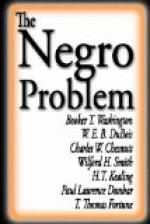However he may be lacking in pride of ancestry and race, no one can accuse the Negro of lack of pride of Nation and State, and even of county. Indeed, his pride in the Republic and his devotion to it are among the most pathetic phases of his pathetic history, from Jamestown, in 1620, to San Juan Hill, in 1898. He has given everything to the Republic,—his labor and blood and prayers. What has the Republic given him, but blows and rebuffs and criminal ingratitude! And he stands now, ready and eager, to give the Republic all that he has. What does the Republic stand ready and eager to give him? Let the answer come out of the mouth of the future.
It is a fair conclusion that the Negro has a firmer and more assured civil and political status in American life to-day than at the close of the Reconstruction period, paradoxical as this may appear to many, despite the adverse legislation of the old slave-holding States, and the tolerant favor shown such legislation by the Federal Supreme Court, in such opinions as it has delivered, from time to time, upon the subject, since the adoption of the War amendments to the Federal Constitution. Technically, the Negro stands upon equality with all other citizens under this large body of special and class legislation; but, as a matter of fact, it is so framed that the greatest inequality prevails, and was intended to prevail, in the administration of it by the several States chiefly concerned. As long as such legislation by the States specifies, on the face of it, that it shall operate upon all citizens equally, however unequally and unjustly the legislation may be interpreted and administered by the local courts, the Federal Supreme Court has held, time and again, that no hardship was worked, and, if so, that the aggrieved had his recourse in appeal to the higher courts of the State of which he is a citizen,—a recourse at this time precisely like that of carrying coal to New Castle.




